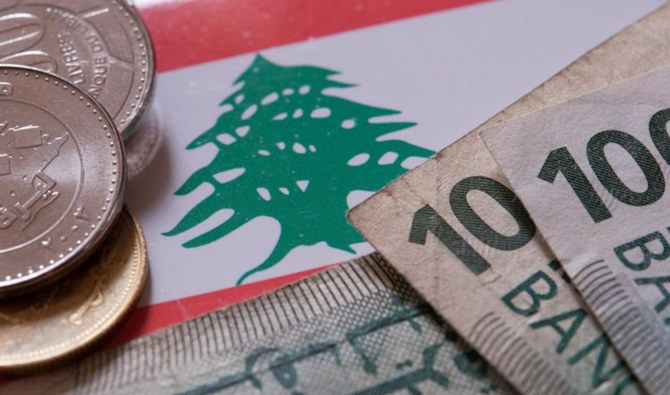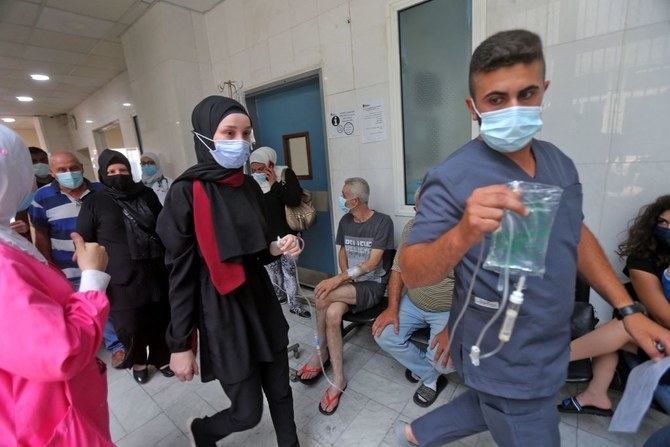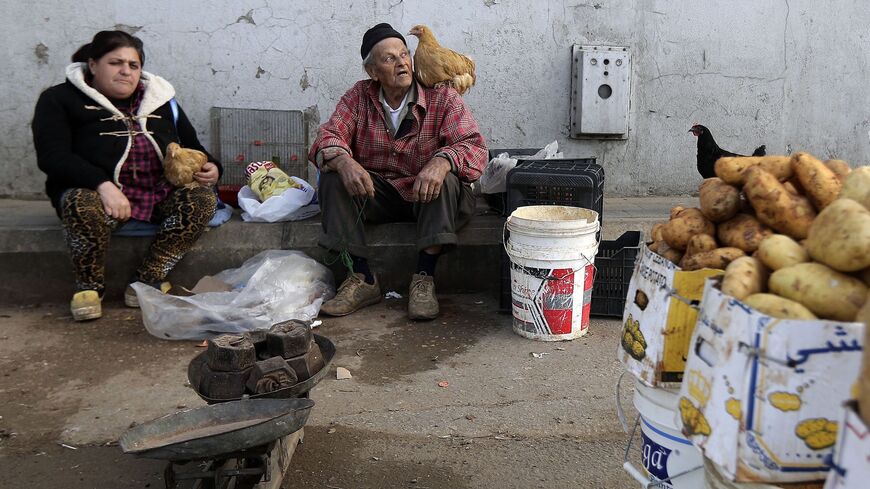
By NAJIA HOUSSARI -- arabnews.com -- BEIRUT: Lebanese money changers refusing to accept older $100 banknotes, known as “white notes,” is causing confusion, particularly after some people were charged an extra $5 fee for exchanging $100 white bills. Dozens of customers flocked to banks to learn more about the news, especially since some of the white $100 notes were issued by banks. A customer told Arab News: “Every Lebanese is keeping a stack of $100 bills in their home for when they need them the most since the banks confiscated our deposits, and no one dares to deposit a single dollar in the bank nowadays.” He added: “I went to my bank to inquire about this new rule adopted by money changers. My daughter told me that one refused to exchange the $100 that she gave him, claiming it was an old edition and he had the right to take $5 as commission if she wanted to exchange it. Who gave them the right to do this? I, my wife and my children all work and we save whatever we make in dollars. Does this mean that our savings have become worthless?” He said: “The bank manager told me that the problem is with money changers, not banks, since they do not have instructions to stop dealing with the old $100 bills; on the contrary, banks are using both the old and new editions. He suggested that I occasionally bring him $200 to $400, in exchange for which he would give me $50 bills until the issue with money changers is resolved.” Over the past few days, the topic of “old, white” $100 and the “new, blue” $100 banknotes has dominated conversation.
Money transfer companies were also said to have refused to deal with the older notes. Some money changers have taken advantage of the ambiguity to impose a $10 fee for exchanging white $100 bills. The confusion was said to said to have been stirred by one of the largest money shipping companies, shut down after it was subject to a judicial investigation into smuggling funds abroad after Oct. 17, 2019 — when the financial crisis hit Lebanon, and in light of which Banque du Liban froze transfers inside and outside Lebanon. Mahmoud Murad, former head of the Syndicate of Money Changers, told Arab News: “This fad has been circulating in the Lebanese financial market for about a week now. We do not know its source, nor who invented it. The problem is that people believe anything in Lebanon.” He added: “People who come to my business to buy dollar bills only accept the blue-colored edition now. We, as money changers, are buying and selling both the old and new editions; nothing has changed.” Murad said: “If the $100 notes are worn-out or torn, we buy them from people but never sell them again. Instead, we give them to shipping companies to return them to the US and replace them with brand-new ones. “But everyone in Lebanon is now a money changer. The Lebanese, the Syrian, the Sri Lankan, the Bengali, the supermarket cashier, the butcher, all engage in exchanging money. Money changers should not be blamed for this.”

by Bassam Zaazaa -- arabnews.com -- BEIRUT: Unvaccinated individuals who spread the coronavirus disease (COVID-19) in Lebanon could be fined 250,000 Lebanese pounds ($165, or a black-market rate of around $10) under a new law ratified by the country’s parliamentarians on Tuesday. The penalty charge sees an increase on the previous fee of 50,000 Lebanese pounds imposed on people who had not been jabbed but had passed on the virus, the National News Agency reported. However, the updated legislation did not make vaccination against COVID-19 obligatory. Lebanese health officials have been urging the public to get inoculated amid a surge in daily infections with 1,707 new cases and 10 virus-related deaths recorded on Tuesday.
On whether citizens would take notice of the fine, Health Minister Dr. Firas Abiad told Arab News: “Within the economic financial situation in Lebanon, and the poverty level, it will certainly have an impact.” However, Lebanese business manager, Hania Michele, criticized lawmakers for what she described as a “purposeless and meaningless law.” She told Arab News: “It is not my fault if someone contaminates me with COVID-19 which will keep on spreading anyway. I don’t know if they are doing it purposely, to indirectly force the unvaccinated to get vaccinated. “Even those who are vaccinated, they could still get infected and spread the virus. That’s why it’s impractical.” Barber Yousef said less than 40 percent of Lebanon’s population had been vaccinated. “I am unsure if people, who are already bankrupt, would be able to afford paying 250,000 Lebanese pounds. So, why are people not getting vaccinated? “It is not wrong to fine those who spread the virus, but people are broke and don’t have the money to pay for PCR (polymerase chain reaction) tests,” he said.

by al-monitor.com -- Andrea Lopez-Tomas -- BEIRUT, Lebanon — Habeeb and Elham Copti used to have a good life. The Lebanese couple remembers the old days when they could eat meat, afford medications and have the lights on — even send presents to their grandchildren. But those times are over. When Habeeb retired, their income stopped and now, both in their 80s, they are facing poverty and uncertainty in Lebanon's economic crisis. "There is no pension from the government when you are old like in most countries. No one is helping us so how are we supposed to pay our bills?” asked Habeeb with tears in his eyes. Lebanon is one of the 16 countries in the world that don't offer social security, according to the International Labor Organization (ILO). The Lebanese Republic is home to the highest number of elders in the region: 11% of its population is over the age of 65. The UN Economic and Social Commission for Western Asia expects that figure to increase to 23.3% by 2050.
Georgette Abou Suleiman worked all her life as a seamstress. "I had lots of orders. I was good at the job,” said the 74-year-old lady from the darkness of her house in Beirut. But 15 years ago, she was diagnosed with Parkinson's disease and she had to quit. I only survive because people help me,” she added. At 20 years old, Marina el Khawand runs the aid group Medonations, which imports medication and provides it to those in need. "Every time Georgette goes to the pharmacy is a struggle because she is not able to find her medicines,” she told Al-Monitor. Since 2019 Lebanon has been facing one of the world's worst economic crises. The Lebanese pound has lost 90% of its value. There is a lack of electricity, water, food and medicine as it grows ever more difficult to import goods into the country.
Excellence, Former un nouveau gouvernement, approuver la tenue d’élections parlementaires anticipées, adopter une nouvelle loi électorale, et élire le président de la …
Khazen History


Historical Feature:
Churches and Monasteries of the Khazen family

St. Anthony of Padua Church in Ballouneh
Mar Abda Church in Bakaatit Kanaan
Saint Michael Church in Bkaatouta
Saint Therese Church in Qolayaat
Saint Simeon Stylites (مار سمعان العامودي) Church In Ajaltoun
Virgin Mary Church (سيدة المعونات) in Sheilé
Assumption of Mary Church in Ballouneh
1 - The sword of the Maronite Prince
2 - LES KHAZEN CONSULS DE FRANCE
3 - LES MARONITES & LES KHAZEN
4 - LES MAAN & LES KHAZEN
5 - ORIGINE DE LA FAMILLE
Population Movements to Keserwan - The Khazens and The Maans
ما جاء عن الثورة في المقاطعة الكسروانية
ثورة أهالي كسروان على المشايخ الخوازنة وأسبابها
Origins of the "Prince of Maronite" Title
Growing diversity: the Khazin sheiks and the clergy in the first decades of the 18th century
Historical Members:
Barbar Beik El Khazen [English]
Patriach Toubia Kaiss El Khazen(Biography & Life Part1 Part2) (Arabic)
Patriach Youssef Dargham El Khazen (Cont'd)
Cheikh Bishara Jafal El Khazen
Patriarch Youssef Raji El Khazen
The Martyrs Cheikh Philippe & Cheikh Farid El Khazen
Cheikh Nawfal El Khazen (Consul De France)
Cheikh Hossun El Khazen (Consul De France)
Cheikh Abou-Nawfal El Khazen (Consul De France)
Cheikh Francis Abee Nader & his son Yousef
Cheikh Abou-Kanso El Khazen (Consul De France)
Cheikh Abou Nader El Khazen
Cheikh Chafic El Khazen
Cheikh Keserwan El Khazen
Cheikh Serhal El Khazen [English]
Cheikh Rafiq El Khazen [English]
Cheikh Hanna El Khazen
Cheikha Arzi El Khazen
Marie El Khazen